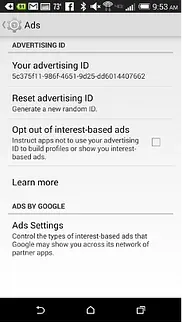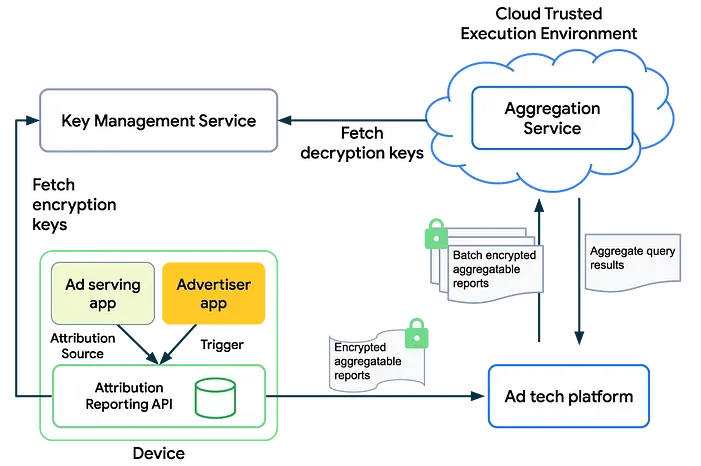Platform
Use Cases
Many Possibilities. One Platform.
AI and Automation
The Always-on Incrementality Platform
Solutions
Teams
Built for your whole team.
Industries
Trusted by all verticals.
Mediums
Measure any type of ad spend
Use Cases
Many Possibilities. One Platform.
AI and Automation
The Always-on Incrementality Platform
Teams
Built for your whole team.
Industries
Trusted by all verticals.
Mediums
Measure any type of ad spend

Google announced their plans to bring the privacy sandbox to the Android operating system. Almost two and a half years following the announcement of the Privacy Sandbox for Chrome - Google made a decision to bring a similar approach to user privacy to the leading mobile operating system in the world.
Google is not the first company to move away from allowing user-level tracking and attribution. During 2021, Apple launched iOS14.5, a version enriched with privacy related features, amongst others - App Tracking Transparency, which effectively restricted any 3rd party from accessing user-level data.
While many developers feared this change, users and regulators cheered it.
Users were now going to be asked if they wanted to allow an app to share their personal identifiable data with 3rd parties.
While there is no unbiased source on this - all sources report opt in rates ranging in the sub twenty percentile.
Google was pressured by both users as well as regulators to make a similar move.
Excerpt from our whitepaper: Measurement in a post identifier world, published in February 2021:
Google doesn’t have the same incentive as Apple to deprecate identifiers that help ad tracking and optimization. The majority of Google’s revenues are related to advertising.
But being the company behind the #1 mobile operating system – Google must get with the trend to please its customer base, as well as meet rising policies and regulations around privacy.
Rather than drop a bomb like Apple tends to do – Google gave developers sufficient time to prepare, announcing the deprecation of Android ID , and offering a new identifier for Advertising – the Google Advertising ID (GAID)
Similar to Apple’s IDFA , the new GAID could be reset, and allowed users to opt out from it. Google “hid” these options under: Settings > Account > Google Listing > Ads
Limit Ad Tracking with GAID only reached 5% of Android inventories by 2020

The Google Android Privacy Sandbox is an initiative led by Google to create standards for apps to access user data while not compromising user privacy. At its core, the Google Android Privacy Sandbox is designed to allow mobile advertising, marketing measurement, and tracking, all without providing access to device identifiers.
Similar to Apple’s SKAdNetwork, the Android Privacy Sandbox offers data sharing only using cohorted data, to protect users anonymity.
FLoC is the core element of the android privacy sandbox. Replacing 1:1 user-level tracking using the Android Advertising ID, the sandbox aggregates user-level data based on context (e.g. campaign id) to allow tracking and attribution to happen, but only in aggregation.
Update: as of January 25 2022, FLoC was replaced by the Topics API
Replacing FLoC, the concept of the new Topics API is to associate users' cohorts based on interest rather than context. This provides somewhat better capabilities for targeting, while still keeping users' privacy, as no user-level data is to be reported.
The classification of Topics is currently still in progress (as of March 8, 2022). Thousands of topics were listed in the proposal stage, these include anything from politics, to fruit.
The benefit of Topics vs. FLoC, is that while FLoC would limit associating the cohort to only one context - Topics allow the same user to be associated with multiple interests, allowing for better targeting and potentially better attribution.

Mobile attribution has relied on user-level identifiers such as the Advertising ID. Android’s privacy sandbox attribution reporting API, is designed to improve user-privacy by removing the use of the device identifier while still providing support for key use cases of attribution and conversion reporting.
Attribution will still happen, but rather than providing attribution on a per user basis, attribution will be cohorted based on context using the Topics API.
The API includes the infamous K-randomized response.
Google’s documentation explains K-randomized response as follows:
“The k-randomized response is an algorithm that is epsilon differentially private if the following equation is satisfied”
In simple terms: the k-randomized response, is an algorithmic mathematical equation that allows data to be shared for the use-case of attribution, only if the number of responses pass a certain threshold.
The equation Google shared in their documentation is:

“k” represents k-randomized
“p” represents probability
“eε” represents epsilon squared
In essence - the two solutions are quite similar in concept. SKAdNetwork and the Google Android Privacy Sandbox both serve to protect user’s privacy by limiting the access to device identifiers and allowing mobile advertising tracking and attribution to continue only in aggregation, not breaking user privacy.
Unlike SKAdNetwork, Google has provided more documentation, a testing framework, and time, so that developers can prepare and adapt to the new framework.
While Google has not specified an exact date - Google gave the market two years to prepare. During this time, Google is requesting proposals for new standards, creating work groups to provide inputs, creating a testing framework, and only once the market has widely accepted the new standards - this will be enforced.
We estimate that Google will deprecate the Advertising ID by March of 2024.
We hope that this article has been helpful for you.
You can find more useful information about the Google Android Privacy Sandbox in the following sources:
INCRMNTAL is a data science SaaS company, developing an incrementality measurement platform, built for a post-privacy world.
The platform allows companies to measure the actual value coming from marketing activities across mobile, web, influencers, TV and any other medium without needing to run any experiments.
We have a solution for marketing measurement without using any user-level data.
Schedule a demo if you want to see our platform in action!

Maor is the CEO & Co-Founder at INCRMNTAL. With over 20 years of experience in the adtech and marketing technology space, Maor is well known as a thought leader in the areas of marketing measurement. Previously acting as Managing Director International at inneractive (acquired by Fyber), and as CEO at Applift (acquired by MGI/Verve Group)